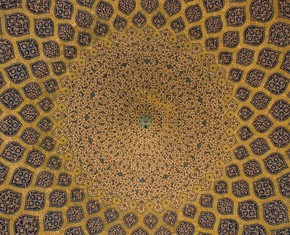The views expressed in our content reflect individual perspectives and do not represent the authoritative views of the Baha'i Faith.
Every religion, faith and belief system begins with the inspiration of an enlightened spiritual messenger—but what relationship do those messengers have to each other?
Many people might say that they have no relationship at all. Although they fulfill similar roles and missions—to bring new ethical and spiritual teachings to their peoples—those wise messengers have different names and titles, appear in different times, and give their messages to entirely different peoples and cultures. Their titles vary, too. We call them prophets, manifestations, wisdom-bringers, divine physicians, culture heroes, seers, oracles.
On the other hand, these spiritual messengers also have a great deal in common. Usually poor, unlettered, and humble, they give us our belief systems. They educate us. They bring new teachings and laws that ignite new societies and inspire humanity to change. They inform culture, art, and even entire ways of thinking. They open new possibilities for peace, kindness, and unity. They teach decency, kindness, and selflessness. Their words and actions gradually infuse themselves into our souls and guide us to lives of expanded awareness and heightened consciousness. They’re related because they remind us that we’re related, not only to nature and its Creator, but to all other human beings.
RELATED: A Rabbi’s Perspective on the Oneness of Religion
Despite all that, we tend to think of them separately, as avatars for a specific age, as the founders of diverse, unrelated, and even conflicting religions.
What if those messengers are truly related to each other, though? What if they have a connection to one another, across time and space and place of birth? Beyond biology, ancestry, and DNA, what if they have a profound inner connection that transcends time and space? What if they each form one link in a long perennial chain of messengers, like teachers in the same school or scientists in a developing discipline?
Of course these messengers, the spiritual leaders of their people and the founders of their religions, offer similar insights into the mysteries of life. But they do much more that that—they bring us moral and spiritual teachings that influence entire civilizations. All human societies draw their bedrock ethics, principles, and laws from at least one of those messengers. You may follow one of these messengers or none of them, but you inevitably swim in the cultural waters their teachings create.
The Lineage of the World’s Spiritual Messengers
The long story of human belief, which extends into the past far beyond the reach of written records, chronicles the mystical lineage of those many prophets. Their very names now stand for entire historical cycles and civilizations – Abraham, Krishna, Moses, Christ, Buddha, Muhammad, and many more.
Humanity has venerated and continued to follow a few of these major prophets over the centuries since they appeared. Some of the less well-known messengers have achieved immortality in one tribe, one place or one society. Other messengers and the messages they taught have largely faded from human memory, consigned to the distant mists of time, only known by those who study extinct cultures.
Originally, though, and regardless of their eventual impact, all of these messengers had much in common when they began to proclaim their teachings to the people of their time. They each created lasting systems of belief, spiritual practice, and devotion. They all taught love, compassion and respect for others. They each generated entire worlds of mysticism, wonder and spiritual significance, which had profound, permanent impacts on many successive generations. All made meaning. Every one of the prophets and messengers built deep repositories of knowledge and awareness by revealing new moral, ethical, and spiritual truths. All opened fresh vistas of reality.
RELATED: How to Recognize All of the Prophets
So wouldn’t it make sense that we might learn from each one of those messengers? Doesn’t it stand to reason that the teachings they brought could overlap, complement each other, or even coincide and agree? Couldn’t it seem perfectly natural that the truths these related messengers taught all drew from the same fathomless well of universal truth?
The Baha’i teachings answer yes to each one of those questions. In a talk he gave in Denver, Colorado in 1912, Abdu’l-Baha—the son and successor of Baha’u’llah, the prophet and founder of the Baha’i Faith—affirmed the Baha’i belief in the essential oneness of all religions:
… it is evident that God has destined and intended religion to be the cause and means of cooperative effort and accomplishment among mankind. To this end He has sent the Prophets of God, the holy Manifestations of the Word, in order that the fundamental reality and religion of God may prove to be the bond of human unity, for the divine religions revealed by these holy Messengers have one and the same foundation.
From a Baha’i perspective, then, every divine messenger represents the return of the previous prophet, and every prophet is related, spiritually, to all others.
















Comments
Sign in or create an account
Continue with Googleor